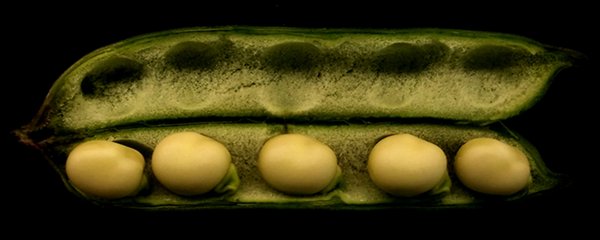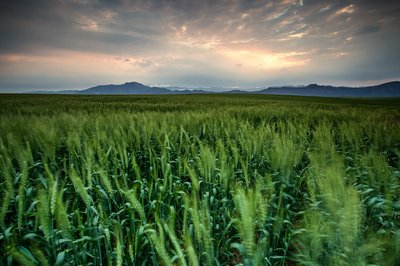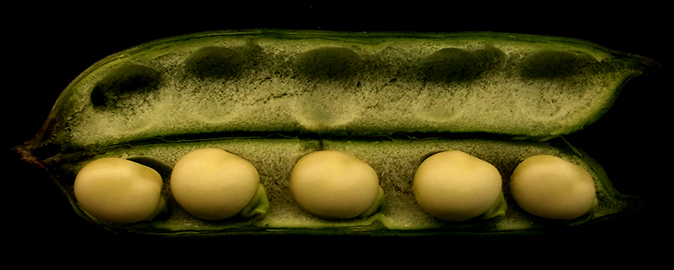Faba bean is a key protein source for tomorrow’s plant-based foods. So far, its extremely large and complex genome has been impossible to characterize, hampering faba bean improvement. Now, researchers have finally decoded the giant faba bean genome.

Researchers from Aarhus University have now discovered the receptor complex crucial for initiating symbiotic signaling in legume plants that engage in symbiosis with nitrogen-fixing bacteria. In the study published in Science, the researchers describe a novel technique using nanobodies to investigate and activate receptor complexes. Surprisingly, the technique also identified barley receptors with a similar function. This opens a new perspective for more sustainable agri-food systems by engineering root nodule symbiosis into important crops using their own genes.

Faba beans are an excellent source of food protein, but about 4% of the world’s population are afflicted by favism, which renders them sensitive to the faba bean anti-nutrients vicine and convicine. Now, an international research team has identified the VC1 gene as responsible for the production of these compounds.
In the face of rapid climate change, it is important that plants can adapt quickly to new conditions to ensure their survival. Using field experiments and plant genome studies, an international research team has pinpointed areas of the genome that are affected during local adaptation to contrasting climates. This new insight into local adaptation represents an important first step towards future development of crops that are resilient to climate change.
An international team of researchers has discovered how legumes are able to tell helpful and harmful invading bacteria apart. The research has implications for improving the understanding of how other plants, animals and humans interact with bacteria in their environment and defend themselves against hostile infections. These findings can have profound implications for both agricultural research and medical science.
Professor Stig Uggerhøj Andersen from the Department of Molecular Biology and Genetics at Aarhus University is part of a European consortium "Legume Generation", which aims at developing plant breeding to make legumes more productive and profitable for European farmers. The consortium has been awarded Euro 7 million from the EU and the UK for the project.
Legume protein will play a major role in future food production, but legumes have long been overshadowed by cereals in terms of research and development investments. The Novo Nordisk Foundation has now supported the N2CROP center for legume innovation with DKK 60 million to accelerate the optimization of legumes as food crops.
Stig Uggerhøj Andersen has been appointed Professor in Molecular Genetics of Plants at the Department of Molecular Biology and Genetics at Aarhus University as of 1 March 2023. His research focuses on understanding legume genetics and microbe interactions to support the Green Transition.

Researchers from the Department of Molecular Biology and Genetics at Aarhus University take part in an international research network, ENSA, which focuses on improving nutrient uptake by plants to reduce the need for fertilizer. The network has just received a total grant of USD 35 million from Bill & Melinda Gates Agricultural Innovations program, of which Aarhus University receives USD 4 million.


The new collaborative platform, Plant2Food, will speed up the development of plant-based foods. On Plant2Food, researchers and companies will work together to explore complex issues within plant and food science and share new knowledge across sectors – without patenting the results. The Novo Nordisk Foundation will support the platform with up to DKK 200 million over the next five years.
![[Translate to English:] planter](/fileadmin/site_files/mb/nyheder/2022/EU_stoetter_forskning_der_skal_designe_afgroeder_til_fremtidige_klimaaendringer-674x270px.jpg)
New tools for root analysis can transform the European agricultural landscape to provide food security and climate change adaptation and mitigation. A network of 22 partners based in Europe and Africa has received a grant of EUR 6,4 to develop new plant varieties adapted to future climate change.
![[Translate to English:] Hestebønner](/fileadmin/_processed_/3/a/csm_Hesteboenner_StigUggerhoejAndersen_fc17298bea.jpg)
Legumes can make agriculture greener, both by carbon fixing, but more specifically because they do not need artificial fertilizers supplying nitrogen, and because their seeds have an advantageous composition of amino acids. A large, European research project focuses on faba beans, which have the potential to become an important part of Danish agriculture.

With a grant of DKK 15 million (EUR 2M) from the Green Development and Demonstration Programme (GUDP) - a programme under the Ministry of Food, Agriculture and Fisheries of Denmark - Danish researchers and breeders will develop new faba bean cultivars for use as a locally grown alternative to imported soy protein.
One of the major challenges in organic farming is maintaining a positive balance in the nitrogen cycle. Nitrogen is an important nutrient for plants, but it is removed from the soil whenever crops are harvested. It can therefore be difficult to maintain a sufficiently high level of accessible nitrogen in the soil without using artificial fertilisers. A new research project intends to change this with a grant of DKK 17 mio. from the Innovation Fund Denmark to Stig Uggerhøj Andersen.